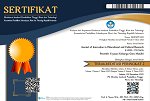Implementation of Entrepreneurship Course in Maritime Higher Education
(1) Sekolah Tinggi Ilmu Pelayaran Jakarta, Indonesia
Abstract
Entrepreneurship course is one of the subjects given to seventh semester cadets majoring in Sea Transportation and Port Management at the College of Shipping. This study aims to determine the implementation as well as an evaluation for further entrepreneurship learning. The evaluation was conducted using the Kirkpatrick evaluation model developed by Mullins which consists of four aspects: satisfaction, learning, behaviour and impact. The method used is a combination of quantitative and qualitative with data analysis in the form of percentages. The sample was taken from 140 cadets who had completed the entrepreneurship course. Data was collected through a questionnaire administered via google form. The results showed that the level 1 evaluation of cadets' satisfaction in learning showed an average score of 71% satisfied learning entrepreneurship and 29% dissatisfied. From the level 2 evaluation, it was obtained that the average cognitive, affective and psychomotor learning outcomes had increased. Level 3 evaluation of entrepreneurial behaviour obtained an average increase of 20 points. Level 4 evaluation of the impact of learning obtained 82% of cadets think it is suitable to be continued, and 75% think entrepreneurship learning is effective in making cadets become entrepreneurs, and 72% form cadets to carry out business activities.
Keywords
Full Text:
PDFReferences
Astar, S. E., The Effect of Entrepreneurship Courses on Student Entrepreneurial Interest. Astar, S. E. (2020). Journal of Technology and Business.124-133. https://doi.org/10.37087/jtb.v2i2.9
(N.T. Ramadhani, Ida Nurnida, 2017)"The Effect of Entrepreneurship Courses on Student Entrepreneurial Interest," Journal of Ecodemica, Vol. 1, No. 1, (2017). registered for publication.
Adrianto, Andhy Tri; Soelistiyono, Anitiyo; Nurkomalasar, Nyayu, The Effect of Entrepreneurship Education and Achievement Motivation on Entrepreneurial Interest of Students of the Faculty of Economics, University of Semarang, Scientific Journal, Solution, Faculty of Economics Semarang, Vol 17 No.2, (2019) 75
Lackéus, M. and Williams Middleton, K. "Venture creation programs: bridging entrepreneurship education and technology transfer".Education + Training, Vol. 57 No. 1, (2015).48-73.
Scarborough, N. M., & Zimmerer, T. W. Entrepreneurship and management. (2008)
Soedrajat, A. The Concept of Entrepreneurship and Entrepreneurship Education in Schools.(2020)
Isrossosiawan, S. The Role of Entrepreneurship in Education. Society.(2013) 26-49.
Meredith, G. G., Nelson, R. E., & Neck, P. A. (1982). The practice of entrepreneurship (Vol. 30, No. 760). Geneva: International Labor Office.
Mullins, D., Lepicki, T., & Glandon, A. (2010). A professional development evaluation framework for the Ohio ABLE system. Ohio State University Center on Education and Training for Employment.
Tamsuri, A. Literature Review on the Use of the Kirkpatrick Method for Training Evaluation in Indonesia. Journal of Research Innovation. (2021) 2723-2734.
Bourkoukou, O., & El Bachari, E. (2018). Toward a hybrid recommender system for e- learning personnalization based on data mining techniques. JOIV: International Journal on Informatics Visualization, 2(4), 271-278.
Kerr, S. P., Kerr, W. R., & Xu, T. (2018). Personality traits of entrepreneurs: A review of recent literature. Foundations and Trends® in Entrepreneurship, 14(3), 279-356.
Taleghani, G. R., Ghafary, A., Keyhani, A., & Ahmadi, S. R. (2013). Personality characteristics and entrepreneurship in online context. International Research Journal of Applied and Basic Sciences, 5(2), 183-191.
Li, X., & Jia, Y. (2015). Characteristics influence for entrepreneurship behavior ability. Proceedings of theInternational Conference on Education, Management, Commerce and Society, 614- 619.
Ganefri, G., Hidayat, H., Yulastri, A., Mardin, A., Sriwahyuni, D., & Zoni, A. A. (2018). Learning tools for entrepreneurship pedagogy with a product-based learning approach in vocational education. Proceedings of Edusainstek National Seminar, 23-32.
Ghareb, M. I., Ahmed, Z. A., & Ameen, A. A. (2019). Planning strategy and the use of information technology in higher education: A review study in Kurdistan Region Government. JOIV: International Journal on Informatics Visualization, 3(3), 283-287.
Mountain, I. N., & Darma, I. K. (2019). The effectiveness and constraints of learning in polytechnic education. Journal of Educational Research and Evaluation, 23(2), 170-183.
Dewi, M., Susanti, E., Susanti, R., Yenni, Z., & Eliza, E. (2020). The effect of personal mindset on behavior of internet entrepreneurship students of Universitas Putra Indonesia YPTK Padang. Sociohumaniora, 22(1), 1-7.
Dewy, M. S., Ganefri, G., & Kusumaningrum, I. (2016). Development of product-based learning model in Power Electronics Practice course. VOLT: Scientific Journal of Electrical Engineering Education, 1(1), 15-28.
Ernawati, E., Buang, N. A., Yulastri, A., & Ganefri, G. (2019). Entrepreneurship career choice and its influencing factors among the graduates of Diploma in Fashion and Design from University of Padang, Indonesia. International Journal of Innovative Technology and Exploring Engineering (IJITEE), 8(7S2), 344-349.
Firmansyah, F., Rahayu, W., & Nurjannah, N. (2020). Evaluation of the entrepreneurship education program through extracurricular activities of Student Company. Journal of Educational Research and Evaluation, 24(1), 51-61.
Refbacks
- There are currently no refbacks.
View My Stats

